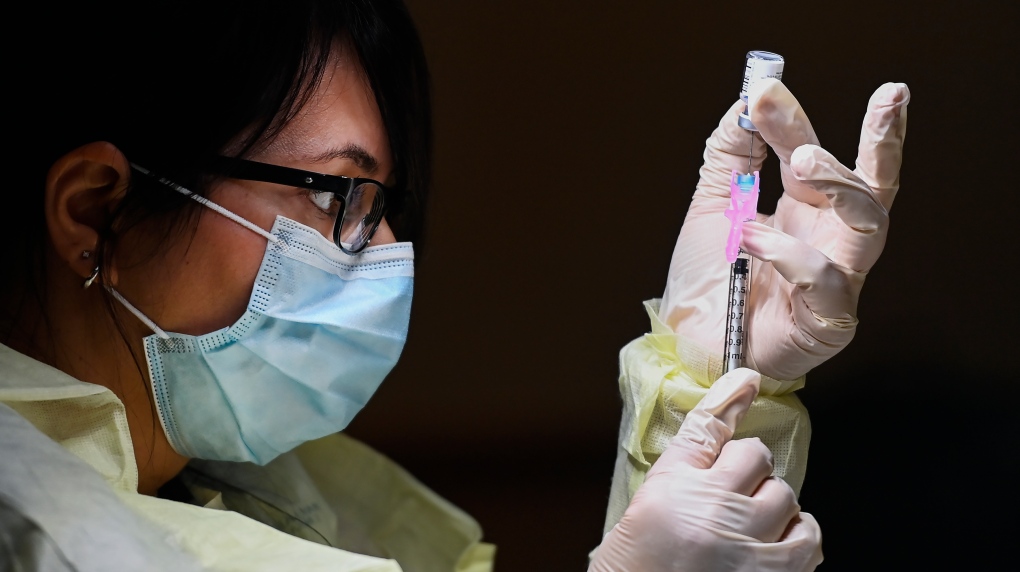Ontario to offer fourth COVID-19 vaccine doses to immunocompromised Ontarians
 Francesca Paceri, a registered pharmacist technician carefully fills the Pfizer-BioNTech COVID-19 mRNA vaccine at a vaccine clinic during the COVID-19 pandemic in Toronto on Tuesday, December 15, 2020. Toronto and Peel region continue to be in lockdown. THE CANADIAN PRESS/Nathan Denette
Francesca Paceri, a registered pharmacist technician carefully fills the Pfizer-BioNTech COVID-19 mRNA vaccine at a vaccine clinic during the COVID-19 pandemic in Toronto on Tuesday, December 15, 2020. Toronto and Peel region continue to be in lockdown. THE CANADIAN PRESS/Nathan Denette
Immunocompromised Ontarians can book appointments for a fourth dose of a COVID-19 vaccine starting tomorrow.
Ontario's chief medical officer of health says the province has already started giving out fourth doses in long-term care homes, retirement homes and other congregate settings.
Dr. Kieran Moore says in order to further protect vulnerable populations, people who are moderately to severely immunocompromised can book a fourth dose starting at 8 a.m. Friday through the provincial vaccine contact centre.
Ontario is reporting 3,630 people in hospital Thursday due to COVID-19, and 500 people in ICU -- an increase in hospitalizations from 3,448 people the previous day, and five fewer people in intensive care units.
Moore says he anticipates Omicron will peak in Ontario in the next few weeks, predicting a difficult rest of the month followed by a better February and March.
The province also reported 35 new deaths Thursday from the virus.
Moore said provincial health officials are trying to determine what is behind large numbers of deaths reported recently, but said many will be due to the previous wave of Delta, a variant that a higher virulence, and some will be attributed to Omicron -- shown to be less severe --because there is such a higher number of cases.
There are 275 people on ventilators due to COVID-19, 10 more than the previous day.
There are 9,909 new COVID-19 cases reported, though Public Health Ontario has noted that the total number is likely higher due to testing policy changes.
Provincial data show 82 per cent of Ontarians aged five and older have received two doses of a COVID-19 vaccine and 88 per cent have at least one dose.
This report by The Canadian Press was first published Jan. 13, 2022.
CTVNews.ca Top Stories

Quebec nurse had to clean up after husband's death in Montreal hospital
On a night she should have been mourning, a nurse from Quebec's Laurentians region says she was forced to clean up her husband after he died at a hospital in Montreal.
Northern Ont. lawyer who abandoned clients in child protection cases disbarred
A North Bay, Ont., lawyer who abandoned 15 clients – many of them child protection cases – has lost his licence to practise law.
Bank of Canada officials split on when to start cutting interest rates
Members of the Bank of Canada's governing council were split on how long the central bank should wait before it starts cutting interest rates when they met earlier this month.
Maple Leafs fall to Bruins in Game 3, trail series 2-1
Brad Marchand scored twice, including the winner in the third period, and added an assist as the Boston Bruins downed the Toronto Maple Leafs 4-2 to take a 2-1 lead in their first-round playoff series Wednesday
Cuban government apologizes to Montreal-area family after delivering wrong body
Cuba's foreign affairs minister has apologized to a Montreal-area family after they were sent the wrong body following the death of a loved one.
'It was instant karma': Viral video captures failed theft attempt in Nanaimo, B.C.
Mounties in Nanaimo, B.C., say two late-night revellers are lucky their allegedly drunken antics weren't reported to police after security cameras captured the men trying to steal a heavy sign from a downtown business.
What is changing about Canada's capital gains tax and how does it impact me?
The federal government's proposed change to capital gains taxation is expected to increase taxes on investments and mainly affect wealthy Canadians and businesses. Here's what you need to know about the move.
New Indigenous loan guarantee program a 'really big deal,' Freeland says at Toronto conference
Canada's Deputy Prime Minister Chrystia Freeland was among the 1,700 delegates attending the two-day First Nations Major Projects Coalition (FNMPC) conference that concluded Tuesday in Toronto.
'Life was not fair to him': Daughter of N.B. man exonerated of murder remembers him as a kind soul
The daughter of a New Brunswick man recently exonerated from murder, is remembering her father as somebody who, despite a wrongful conviction, never became bitter or angry.
































